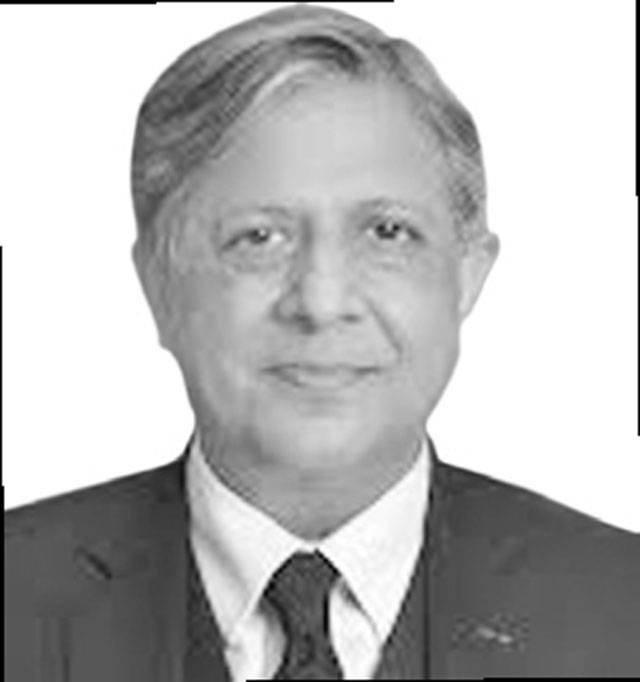
On 9th May 2023—The Black Day, rightly called—after the arrest of PTI Chairman Imran Khan, a guided mob of PTI workers willfully and maliciously vandalized and burned public and military properties. The outrageous defacement and desecration of Shuhada Monuments, the Jinnah House—related to the Founder of the Country (temporary residence of Corps Commander Lahore)—attacks on GHQ and other military installations across the country and the burning of Radio Pakistan Building were an unprecedented, unimaginable and horrendous spectacle for every patriotic Pakistani. Many observers justifiably compared these events with the 9/11 attacks and the attacks carried out by Tehreek-e-Taliban Pakistan. Few political leaders even drew similarities with attacks carried out by India against the country. But it is deplorable to see the country’s own political party’s involvement in that crime against its military and state symbols.
The planners of the attacks failed to see its implications on national security, the economy and the stature of the country in the international community. The events of 9 May have sent a wrong message internationally and have tarnished the image of the Pakistan Army. It has given the opportunity to foreign and local inimical voices to raise questions pertaining to the security of our nuclear assets. Economically, social unrest is always followed by a reduction in a country’s GDP in succeeding months. Pakistan was already in an economic quagmire and these events exacerbated the dire situation.
Ironically, PTI’s appointment holders straightaway denied their involvement in the face of the country watching the events unfolding. They along with a few like-minded intellectuals and lawyers termed it as a conspiracy to malign PTI and attempts by PDM Government to drive a wedge between PTI and the Army. Even the PTI Chairman, in an attempt to evade responsibility, lied in front of the court that he was not in possession of his mobile and thus not in knowledge of what happened in his absence. All these claims proved to be wrong with leaked audio conversations between them and the activists.
To avoid such occurrences in the future, the Federal Government and the High Command of the Armed Forces decided to try the planners, instigators, abettors and perpetrators involved in the May 9 Tragedy under Pakistan Army Act and Official Secrets Act as per the existing and established legal procedures derived from the constitution.
While a majority of the nation who are patriotic and consider the Pakistan Army as the bulwark and parapet of national security and integrity are in favor of trying 9 May Miscreants in military courts, there are lawyers, local/ foreign journalists, politicians and so-called human rights activists raising questions that whether a trial conducted by military courts fulfills the due process required for a fair trial as guaranteed by the Constitution. The misinterpretation of the Pakistan Army Act and its corresponding Military Justice System has led to considerable discontent amongst the masses. The fear of infringement of basic human rights and degradation of democracy has further exasperated the situation.
When are the military courts established and civilians tried under military laws? First when a civilian is involved in espionage, treason, or attacks on military personnel or property. Second, when a country faces a threat to national security and an emergency is declared in that country. In aforementioned cases and especially when civil courts are not able to ensure trials in time, the government may use military courts for the purpose due to their capability of handling cases swiftly and efficiently. In a number of jurisdictions around the world, military courts are used to prosecute civilians for terrorism or other offences that pose a threat to the country’s security. With the basic conceptual understanding of the Pakistan Army Act and its corresponding Military Justice System it would be easier to shun away the rumors spread over the social media with a more logical perspective.
Military Courts function under Pakistan Army Act and as part of the Judicial System of Pakistan and are established to reinforce existing legal framework. They were made part of the National Legal System after enacting certain amendments in the Army Act and the Constitution of the Islamic Republic of Pakistan 1973. In certain cases, in the past, the Supreme Court of Pakistan (SCP) upheld the jurisdiction of military courts to try and sentence convicts of offences that are subject to the Army Act.
Military Courts follow a legal procedure scheme that safeguards rights of the accused in accordance with the Constitution of Pakistan and ensures fairness during all stages of a trial. These include the provision of grounds of arrest, counsel access, protection against double jeopardy, provision of the charge sheet, provision of a statement of evidence, right of hearing, recording of evidence, right to appeal, judicial review and right to file mercy petition. Civilians tried under the Army Act, by the military courts, undergo largely similar processes in terms of law and procedure as in session courts.
Let us now examine a few issues raised in the public domain with respect to international conventions and domestic laws against the legal transfer of PTI Culprits from civil to military courts for trials under the Pakistan Army Act 1952 (PAA) and Official Secret Act 1923 (OSA) with a subsequent attempt to address the concerns raised with the yardsticks of international conventions and the constitutional parameters under national laws:
• Establishment of Military Courts and the Arrests Amounting to Arbitrary Detentions Under International Law and Concerns Over Post-Arrest Treatment/ Custodial Torture. Accused are kept strictly under the legal provisions and basic principles of human rights with access to defense counsel and near relatives under the provisions of PAA Section 73. {(Custody of Offenders), which states that “any person subject to this act who is charged with any offence may be taken into military custody”}.
• Concerns of Amnesty International; Trying Civilians in Military Courts – Contrary to International Human Rights Laws (IHRL)
• It is absolutely within the constitutional parameters under the nationally enacted statutes. The offenses committed are of the military domain and civil courts have the jurisdiction to transfer such cases to military authorities under the provisions of Section 549 (3) of Criminal Procedure Code (CrPC) {A person arrested by the police if subject to PAA-1952 and the offence committed triable by Court Martial will be taken in custody by the military and investigated accordingly read with Rule 7 (f) of the Criminal Procedure (Mil Offenders) Rules 1970 (person subject to military, naval or air force Law includes a person not otherwise subject to any such law who is brought before a magistrate and is accused of an offence mentioned in clause (d) of section 2 of PAA 1952 or sub-section (3) of section 2 of PN Ordinance 1961 or clause (dd) of section 2 of PAF Act 1953} for subsequent trial under PAA 1952 read with OSA 1923.
Trials under military laws do not violate human rights as these provisions are available since 1967 and being used for specified offences under Section 2 (1) (d) {(Persons subject to Act) Persons not otherwise subject to this act who are accused of having committed in relation to any work of defense, arsenal, naval, military or air force establishment or station, ship or aircraft or otherwise in relation to the naval, military or air force affairs of Pakistan, an offence under the OSA 1923}, Section 59 (4) {(Civil Offences) (notwithstanding anything contained in this act or in any other law for the time being in force a person who becomes subject to this act by reason of his being accused of an offence mentioned in clause (d) of sub-section (1) of section 2 shall be liable to be tried or otherwise dealt with under this act for such offence as if the offence were the offence against this act and were committed at a time when such person was subject to this act and the provisions of this section shall have effect accordingly}, Section 73 of PAA – 1952 {(Custody of Offenders) (details mentioned in question 1)} read with OSA 1923.
• All these laws are National Statutes of Pakistan in conformity to the Constitution of Pakistan specially enacted for the same purpose with Settled Judgments of Superior Judiciary. It settles and adheres to all the constitutional parameters of a fair trial. In clear terms, such cases are always transferred to military authorities when offenses committed are in relation to the Defense of Pakistan and military affairs under OSA which squarely comes within ambit of PAA 1952.
• Pakistan, a Signatory of the International Covenant on Civil and Political Rights (ICCPR). Article 14 Guarantees Right to Fair Trial.
• By no means it takes away the constitutional rights of fair trial rather it guarantees the basic human rights through Judicially acceptable, time-tested and settled procedures of the laws of the land. It provides all basic rights of preparation of defense, hiring of services of defense counsel of own choosing as per PAA Rule 87 {(Qualification of counsel) (1) neither the prosecutor nor the accused has the right to object to any counsel if properly qualified. (2) counsel shall be deemed to be properly qualified if he is, being a Citizen of Pakistan, a legal practitioner authorized to practice with right of audience in a court of sessions in Pakistan}.
• The complete procedure of witnesses’ examination and cross-examination by defense within the legal impositions, legally settled course of prosecution and defense would be available. Above all, the accused will have the right of appeal at appellate forum against the trial court verdict in both at Army Court of Appeals under PAA 1952, Section 133 A {(The Court of Appeal (for Hadd Cases) shall have power to; (a) confirm the findings or sentence of both or (b) substitute a valid finding or sentence for invalid findings or sentence or (c) call any witness for the purpose of recording additional evidence in the presence of the parties who shall be afforded an opportunity to put any question to the witness or (d) Annul the proceedings of Court Martial on the ground that they are illegal or unjust or (e) order the retrial of the accused by a fresh court} as well as at Superior Judiciary under Article – 185 (Appellate jurisdiction of Supreme Court) and Article – 199 (Jurisdiction of High Court) of the Constitution
• International Humanitarian Law (IHL) Allows for the Trial of Offenders in Military Tribunals in Case of Existence of an External/Internal Armed Conflict. Political Turmoil, not an Armed conflict, precludes the application of IHL in Pakistan. Only the accused having physically assaulted and planned/ abetted the attacks on GHQ and other military installations are brought under the trial ambit of PAA 1952. Statistics show apprehension of many individuals, whereas only the actual culprits who were involved in their nefarious designs of destroying, burning and targeting sensitive installations, stealing confidential files/ secret documents and other military properties are being tried under military law. It may be noted that those restrained in doing so are not subjected to trials under military law.
• Public Hearings on the Lines of the International Criminal Court (ICC) and International Court of Justice (ICJ), If there is no State Secret Involved. Military Courts Trials are always in open courts and civil defense counsels also participate in it. However, ‘In Camera Sessions’ on the lines of ICC and ICJ are held owing to the confidentiality and sensitivity of the matters involved. Therefore, no compromise on legal fundamental rights and fair trial is involved.
• Consistency with Pakistan’s Human Rights Obligations/ Stance and International Laws/ Standards. It is completely legal under the provisions of National Statutes and Constitution of Pakistan as provided in other countries, specifically cases pertaining to OSA.
• Military Courts Unprecedented. Pakistan is an exception in the world. Not unprecedented especially in the case of offences committed on GHQ/ other military Installations under OSA 1923 which calls for Field General Court Martial (FGCM) through PAA 1952. Military courts also persist in other countries of the world.
• Maximum and Minimum Punishment by Military Courts to the Convicts. The minimum punishment can vary from acquittal to 14 years rigorous imprisonment. Capital punishment can be awarded where the conviction establishes the nexus of convicts to hostile intelligence agencies or their acts make them guilty of aiding foreign powers in their agenda against Pakistan.
• Solitary Confinement of the Accused; Violation of International Laws on Torture and Custodial Death. Pakistan is well aware of its responsibilities/ international obligations with respect to Article 5 of the Universal Declaration on Human Rights and Article 7 of the International Covenant of Civil and Political Rights. Both of which provide that no one shall be subjected to torture or cruel/ inhuman and degrading treatment or punishment. It is mandatory abidance on Pakistan by Resolutions of the United Nations General Assembly of 9 December 1975. Violation or maltreatment is completely a punishable offense. Nothing in derogation to the provision of torture and custodial death can be tolerated in any manner whatsoever being an offense under the enacted laws apart from the International obligations on Pakistan.
• Basic Facilities Provided to Accused Females. There is no female accused in military custody at present. The law of the land on the conduct of female prisoners is absolutely clear, vivid and tangible. Pakistan Army has all the female staff to cater for any such eventuality; including completely isolated detention facilities, female officers to overwatch/ Interrogate, and necessary female administration staff to look after the female detainees.
• Provision of Counselor Access to the Accused Holding Dual Nationality. In line with Article – 36 of the Vienna Convention they will be provided with Counselor Access.
• Enactment of Military Courts without Legislation Contrary to Practice of 2015 and 2017. Statutes like OSA 1923 are already available since 1967 and are being rationally used for offences committed against GHQ and other military Installations by the rioters which are exclusive of the military domain and for that, no amendments and legislation are required. The Proscribed Organization committed terrorism offences all across the country, challenging the national security and integrity of Pakistan for which no ‘Special Laws’ were available, hence special enactment was made in the shape of the 21st and 23rd Constitutional Amendments.
• Trials of All Individuals Involved in the May 9 Incident, Indiscriminately. It is an absolutely wrong perception built and propagated by sympathizers and perpetrators of the May 9 incident. Only the accused having physically assaulted and planned/ abetted the attacks on GHQ and other military installations are brought under the trial ambit of PAA 1952.
• Exclusion of Pakhtoon Tahaffuz Movement (PTM), Involved in Diatribe Against the Army and its Leadership from Trials in Military Courts. Only offenders falling within the domain of OSA 1923 are subjected to PAA 1952 and will be tried in Military Courts.
• Peshawar High Court (PHC) Verdict in 2018 Questioning Competence of the Defense Counsel and Veracity of Confessional Statements as Evidence. Measures Adopted to Avoid Such Anomalies Again. These cases are entirely different (related to OSA 1923) from the terrorism-related cases under Spec Military Courts Established at that time. Secondly, the case mentioned is still sub-judice at SCP against the PHC Verdict, so the question can be termed as a comment on PHC Verdict and cannot be called a legal stance.
• Persistence of the Army to try Civilians in Military Courts in the Presence of an Independent, Vibrant and Working Judicial System. The offences committed are of completely Military domain and Courts themselves have exercised their Jurisdiction to transfer such cases to military authorities under the provisions of Section 549 (3) of CrPC {(referred to in question 2) read with Rule 7 (f) of the Criminal Procedure (Mil Offenders) Rules 1970 (details narrated in question 2)} for subsequent trial under PAA 1952 read with OSA 1923.
• Abidance by its Obligations, to the Right of Fair Trial to all Citizens Under Article 8 and Article 10 A of the Constitution, by the Army When it is Part of the Executive. Military Law is a National Statute of Pakistan in conformity to the Constitution of Pakistan specially enacted for the same purpose with Settled Judgments of the Superior Judiciary. It settles and adheres to all the constitutional parameters of a fair trial under the Constitution.
• Determination of the Guilt and Innocence of the Accused; Standards of Evidence to Establish Burden of Proof. All the provisions of Qanoon-e-Shahadat and legally admissible evidence required by any other constitutional court will be adhered to; with no compromise whatsoever.
• Meeting of Apprehended Individuals with their Family Members. They are kept strictly under the legal provisions and on the basis of principles of human rights with access to defense counsel and near relatives under the provisions of PAA Sec 73 {(Custody of Offenders) (explained in question 2)).
For speedy and assured dispensation of justice military courts are the most suitable forum. In order to prevent heinous crimes against state symbols and public and military installations in the future, such as committed by PTI workers on 9 May 2023, it is imperative for the state and the government to ensure decisive action against the planners, instigators, abettors and perpetrators, failing which will embolden and reinvigorate these miscreants and pave the way for further attacks.
This post was originally published on this site be sure to check out more of their content.








